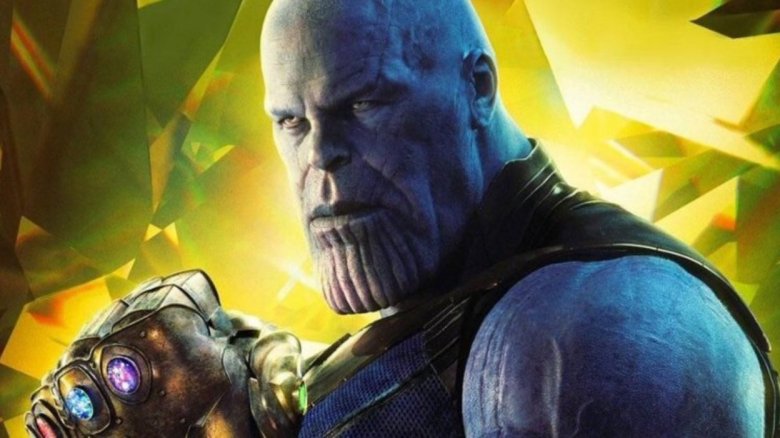The Enormous Thanos Twist In Endgame Finally Explained
When in doubt, hit the audience with a shocking twist.
That seems to be the thought process of Avengers: Endgame screenwriters Christopher Markus and Stephen McFeely, who recently sat down with the New York Times to discuss a number of the film's plot points in the wake of its runaway success. Fair warning: major spoilers for Endgame follow.
The moment in question occurred early in the film, when the remaining Avengers and Captain Marvel tracked Thanos down to the lonely planet to which he retreated after snuffing out half of all life in the universe at the conclusion of Avengers: Infinity War. Their goal: to swipe the Infinity Stones and undo the damage the Mad Titan had done. But upon arriving, they found that Thanos had used the power of the stones to reduce them to atoms (and had nearly killed himself in the process), rendering their mission moot. In a moment of pure frustration, Thor did what he should have done during the Battle of Wakanda and went for the head — killing the most formidable foe the Avengers had ever faced roughly 20 minutes into the movie.
It was a shocking narrative decision, one which Markus and McFeely admitted they struggled to pin down. "We always had this problem," McFeely said. "[Thanos] has the ultimate weapon. He can see [an attack] coming. It's ridiculous. We were just banging our heads for weeks, and at some point, [executive producer] Trinh Tran went, 'Can't we just kill him?' And we all went, 'What happens if you just kill him? Why would you kill him? Why would he let you kill him?'"
The answer to that last is implicity itself: Thanos had accomplished what he set out to do. "It reinforced Thanos' agenda," Markus explained. "He was done. Not to make him too Christ-like, but it was like,'If I've got to die, I can die now.'"
Indeed, it seems likely that Thanos had a pretty good idea what was about to happen when cornered by all of the surviving heroes who had opposed him and one tremendously powerful new one. Thor's brutal beheading of the Mad Titan benefited no one; it was an act of pure frustration, one which was never going to bring back the Infinity Stones or any of the Avengers' fallen comrades. One could even go so far as to say it gave Thanos the last laugh, and if it was a cathartic act for Thor, it certainly wasn't apparent in what became of the Thunder God afterwards. Retreating to New Asgard to drink beer, play video games, and gain just a little bit of weight, he refused to even have Thanos' name spoken in his presence when Bruce Banner and Rocket showed up to brief him on the team's new plan. In fact, it seems likely that the noble Asgardian's killing of an unarmed, defenseless opponent may have been the final straw in causing him to spiral into a years-long bout with depression.
All of this served to give Thor, who has not-so-quietly gone from a rather one-note hero to one of the most interesting and complex characters in the MCU, one of Endgame's most emotionally satisfying arcs. It wasn't until his encounter with his mother Frigga in 2013, during the Avengers' time heist to recover the Infinity Stones, that he began to come to terms with the failure that was definitively cemented when Stormbreaker met Thanos' big purple dome. It all fell into place neatly for Markus and McFeely, who had gone into the screenwriting process with little idea of where they could take the Asgardian's personal journey in Endgame.
"When we were spitballing for Endgame, we started with, Thor's on a mission of vengeance," said Markus. "And then we were like, he was on a mission of vengeance in the last movie. This is all this guy ever does! And fails, all the time. Let's drive him into a wall and see what happens."
Here's what happened: in compounding his failure to stop Thanos in a moment of weakness, and then failing further to process the ramifications of his actions in a healthy manner, the near-immortal god was made supremely relatable to the audience. Fortunately, after five years, the Avengers were given a second chance to reverse the Decimation thanks to a helpful mouse who released former bit player Ant-Man and his critical supply of Pym Particles from the Quantum Realm. The Snap was reversed, all of the dusted heroes returned, and Thor — seemingly at peace for the first time in a very long time — departed to go on intergalactic adventures with the Guardians of the Galaxy.
Here's hoping that Marvel Studios sees fit to continue exploring the journey of Odinson, which started off a bit boring, became amazingly hilarious, turned desperately heartbreaking, and is now imbued with a glimmer of redemption. Of all the original six Avengers, it makes the most narrative sense for the Thunder God's story to continue — and Chris Hemsworth has proven himself more than capable of taking the character to more interesting places than we ever expected. Will he play a key role in Guardians of the Galaxy Vol. 3, going into action to face some new threat along with his sweet rabbit? Will he return for another crossover team-up film during the MCU's next phase? Or, will he become the first Avenger to get a fourth solo flick? Only time will tell.
